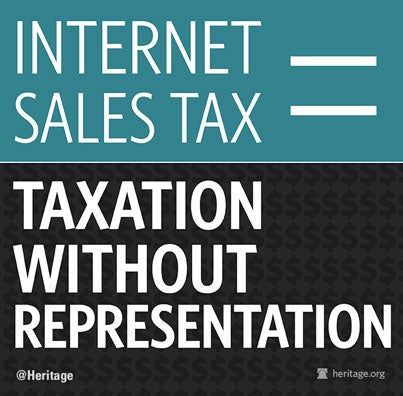Pro-Internet-Tax Groups Get the Facts Wrong
James Gattuso / Curtis Dubay /
A letter from a small group of four pro-Internet-tax advocacy groups sent to Members of Congress yesterday claims that The Heritage Foundation is wrong on the policy and the facts regarding the issue of Internet sales taxes. Their assertion falls short.
There are several fatal problems with the bill, which would allow states to force out-of-state businesses to collect sales taxes for them. The misnamed Marketplace Fairness Act (MFA) would be bad for consumers and bad for America.
Right now, under the long-standing “physical presence standard,” states can force only businesses that have a store, plant, or warehouse within their borders to collect their sales taxes on their behalf. This standard originated in the 1992 Quill Supreme Court case and has worked well since.
This is why, if you buy something online from a business that had no presence in your state, it doesn’t have to collect sales tax from you. The MFA would overturn the physical presence standard and force those out-of-state businesses to collect that tax and remit it to your state.
The authors of yesterday’s letter argue that such state power “asserts federalism” by “returning decision making authority over the collection of state taxes to state legislatures, where it belongs.” This interpretation misses the mark.
State legislatures been not been denied their right to establish their own sales tax laws. Indeed, they have all made decisions as to whether—and to what extent—sales should be taxed. Rather, they’ve been denied the ability to apply those laws to businesses that have no presence within their borders. That states can have their own laws that apply only to people and businesses that choose to reside within the state’s borders is at the very heart of federalism. Strike that away, as MFA does for sales taxes, and federalism becomes a badly weakened principle.
In their letter, the four signers also point to a statement in a joint memo signed by the president of our sister organization Heritage Action—as well as more than 50 other conservative leaders—that the MFA would impose “added costs for retailers and American consumers, directly through the sales taxes imposed, but also through the added burden of collecting the taxes for the 9,600 separate taxing jurisdictions in the U.S., each with its own unique definitions, holidays, and rates.”
The four signers of yesterday’s letter argue that this statement is incorrect, since the MFA requires states to identify a single statewide agency to administer sales tax collections. This provisions limits taxing jurisdictions to “only” 46 authorities. But retailers would still be subject to the tax laws of each of the nearly 10,000 tax jurisdictions, each of which has its own rates and tax base, a Herculean task.
Allowing state tax officials to force online businesses in other states to collect their taxes is simply a bad idea.

